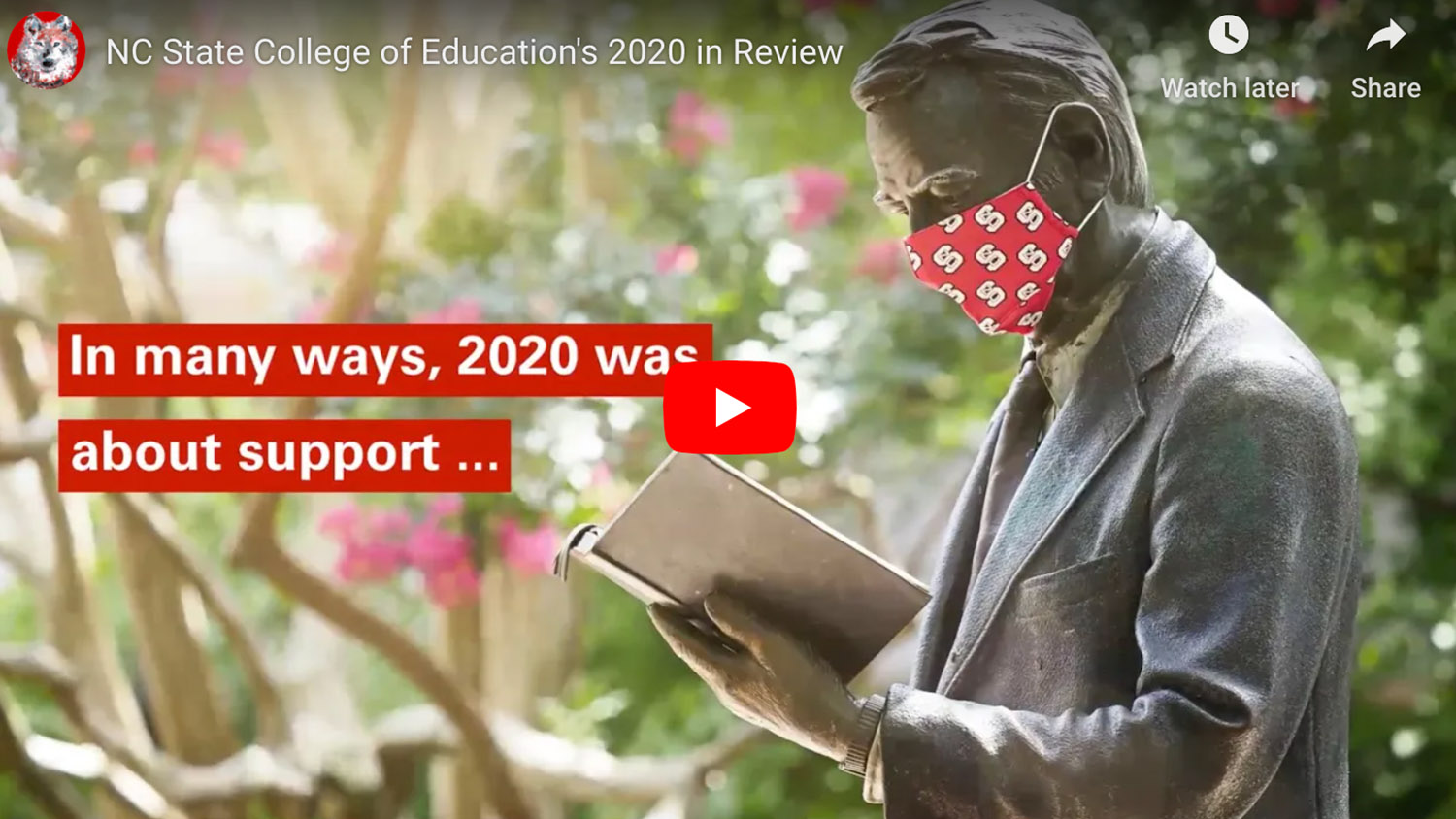
2020: Year in Review
The year 2020 was difficult and different. Through this challenging time, NC State’s College of Education has been part of the solution in addressing urgent educational challenges associated with the coronavirus pandemic and racial injustices while strengthening its land-grant mission to champion the educational success of all. Below is a look at some of the ways the college did that in the past year and a few other highlights. The items are listed in no particular order.
The College of Education supported over 70,000 educators, caregivers and leaders during the COVID-19 pandemic.

Since the COVID-19 pandemic led to a move to at-home learning in March, dozens of faculty, staff and students from the College of Education have been involved in delivering a variety of educational resources such as webinars, professional development and tips related to COVID-19. Over 70,000 educators, leaders and caregivers have been reached through the college’s efforts so far.
Faculty have worked to provide resources on topics such as helping students with disabilities learn remotely during the pandemic, how to find credible news sources during the pandemic, math tools to help parents and teachers teach advanced math skills to middle school students and tips for coping with mental health.
The work of the Friday Institute for Educational Innovation and Belk Center for Community College Leadership has been invaluable to the state during this time. The Friday Institute alone has reached over 50,000 educators through professional learning. And the Belk Center offered support to all 58 community colleges in the state by offering one-on-one webinars and other resources to help with the transition to online teaching.
The College of Education intensified its efforts to advance diversity, equity and inclusion.
As calls for an end to racial injustices intensified this summer, the College of Education reaffirmed and strengthened its commitment to addressing racism and advancing a diverse, inclusive and supportive culture both within the college and across the field of education. In addition to forming a task force to address issues related to racial injustice, faculty have authored resources to foster anti-racist education in classrooms, empowered historically marginalized youth voices, released publications to improve multi-cultural and social justice counseling practices, helped students gain new perspectives on equity issues and found a way to reduce barriers for doctoral students of color in the Community College Leadership program.
Alumni and graduate students, meanwhile, have helped to develop Diversity Education Resources, established a White Anti-Racist Educators Reading Group to facilitate more equitable learning environments and helped to revamp NC State’s Equal Opportunity Institute, among other initiatives.
Faculty, staff and research associates broke a record for research funding for the third straight year.
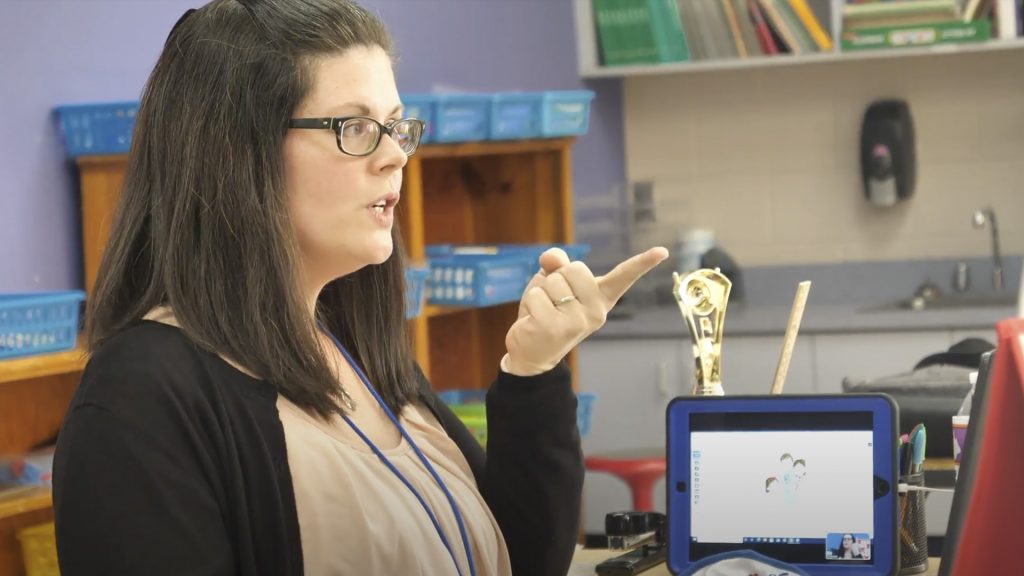
Faculty and staff in the College of Education, including research associates with the Friday Institute for Educational Innovation and the Belk Center for Community College Leadership and Research, were awarded 54 grants totaling $30,485,332 in the 2019-20 academic year, setting a record for highest total dollar amounts awarded in a single year for the third consecutive year.
This funding goes directly toward supporting improvements in North Carolina schools, colleges and communities. Faculty and staff apply research to practice as they study and improve the dynamics of teaching and learning through field-based research that addresses urgent needs, such by training literacy experts, providing support for students with learning disabilities to explore STEM careers and promoting a sense of student belonging to foster academic achievement.
$92M
in total funded active research projects*
$30.5M
in external research grants awarded in 2019-20
110
total funded active research projects*
*Based on external sources of funding only.
U.S. News ranked the College of Education the #31 best graduate college of education in the nation.
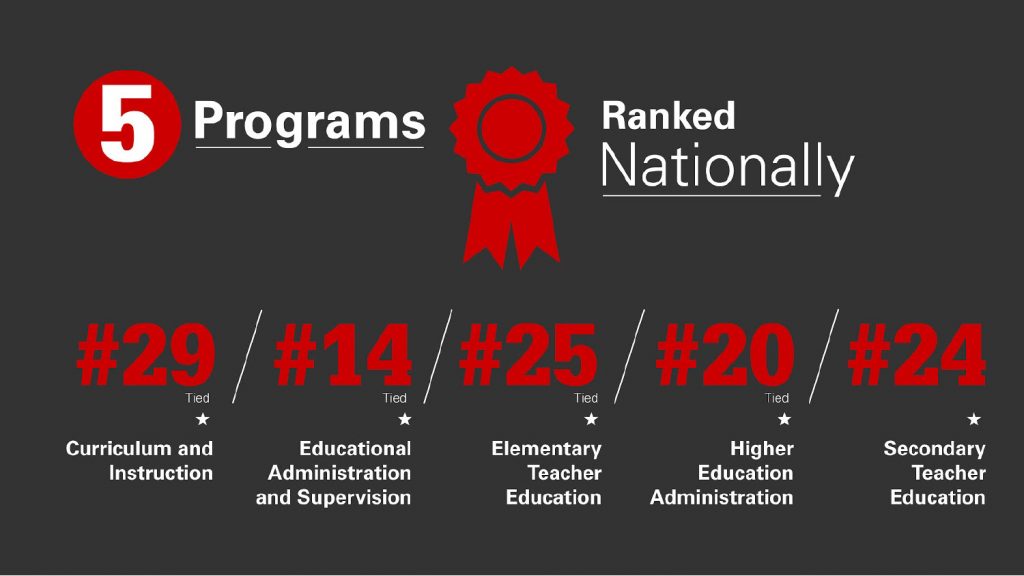
The College of Education jumped 14 spots in the U.S. News and World Report’s 2021 Best Graduate School Rankings to tie at #31 in the nation among all colleges of education and #21 among public colleges of education.
This ranking places the college in the Top 8% among all 393 graduate colleges of education in the nation. In addition, five programs within the college — Educational Administration and Supervision (tied #14), Curriculum and Instruction (tied #29), Elementary Teacher Education (tied #25), Higher Education (tied #20), Secondary Teacher Education (#24) — were ranked in education specialty areas.
The College of Education was also the only college of education in North Carolina to be ranked in the Top 15 in the nation across multiple categories in the U.S. News and World Report’s 2020 Best Online Master’s Education Programs.
The College of Education continued to help the state and nation meet workforce development goals, including by establishing the Artificial Intelligence Academy.
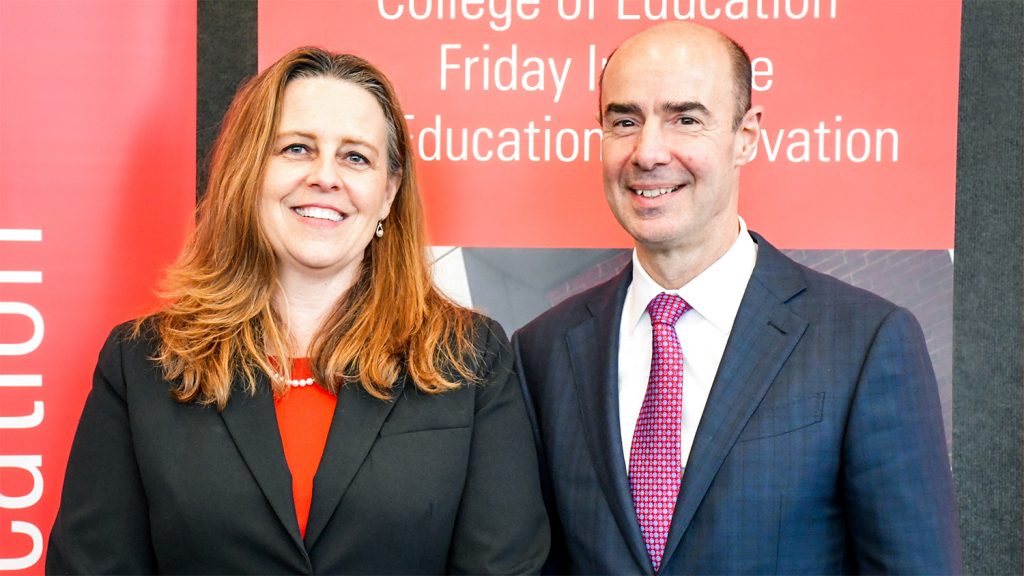
The college received a $6 million grant from the Department of Labor to create the Artificial Intelligence (AI) Academy. Led by Professor Carla C. Johnson, Ph.D., the AI Academy will support 5,000 workers — with a focus on veterans, unemployed and underemployed workers and current informational technology employees — with training, college coursework and certification to work in the emerging artificial intelligence field.
The AI Academy joins an array of other ongoing College of Education projects and programs focused on workforce development goals, including the Belk Center for Community College Leadership and Research, a Master of Education in Training and Development to prepare professionals in a variety of sectors, a graduate certificate in Teaching, Training and Educational Technology and a CTE Research Program at NC State sponsored by the ECMC Foundation.
The College of Education opened the 2020-21 academic year with an increase in new student enrollment for the fourth straight year.
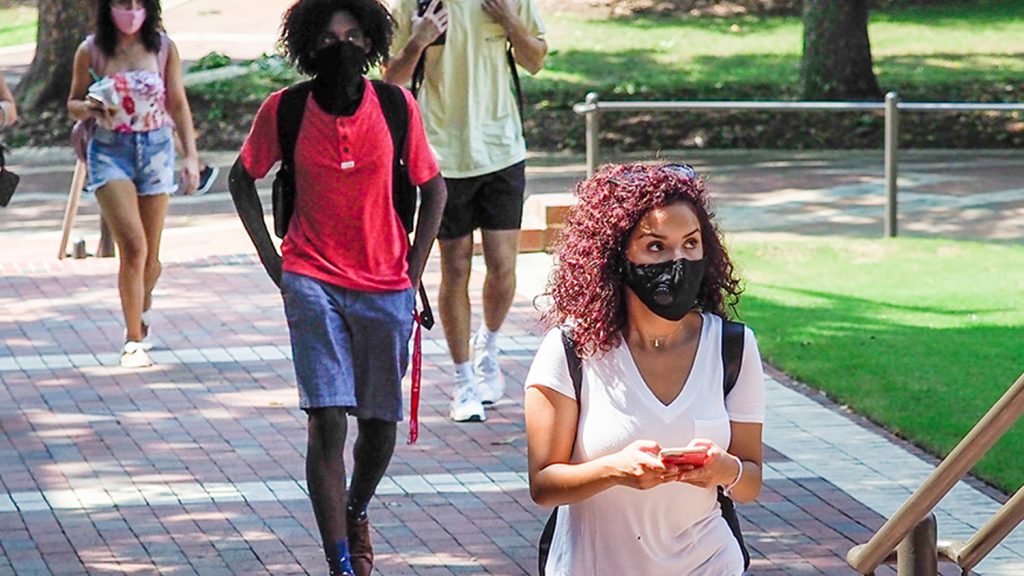
While enrollment across undergraduate and graduate education programs across the nation have declined over the past 10 years, NC State’s College of Education has recorded growth in new student enrollment for four straight years, with a jump of 26% since 2017. Even this fall, the college’s new student enrollment increased 2%.
The Master of Arts in Teaching (MAT) program — an 100% online accelerated teaching licensure program through which students earn both a master’s degree and their initial teaching license — increased by 15% over last year. In an effort to help with recruiting, the dean allocated $34,000 from the College of Education Excellence Fund to award scholarships to 18 MAT students for the fall 2020 semester.
The College of Education’s Master of School Administration (MSA) received NC State’s Opal Mann Green Engagement and Scholarship Award and expanded its ability to prepare more future principals.
The Master of School Administration (MSA) program, an innovative principal preparation program that provides early career support and continuous professional development for future school leaders, received the Opal Mann Green Engagement and Scholarship Award. The award recognizes a team dedicated to community-based learning and mutually beneficial action around local issues, the creation of inclusionary teams and the use of democracy in the classroom, community and at home.
The honor came on the heels of a $3.75 million grant from the N.C. Principal Fellows Commission that enables the MSA program to expand delivery of the innovative program through the training of two new cohorts of future principals and the development of new partnerships with North Carolina school districts. U.S. News ranked the MSA program the top principal preparation program in North Carolina and #14 in the nation.
“NC State’s principal preparation program is unlike any other principal preparation program in the country. Besides preparing our folks to be day-one ready divergent thinkers and problem solvers, we help them to be the very best people they can be,” said Professor and NC State’s Leadership Academies Director Bonnie Fusarelli.
The first two College of Education students completed the College of Education Summer Internship Program, which was established in memory of Chantal Warfield ’19.

Two students were named the first participants of the College of Education Summer Internship Program — a competitive, eight-week summer internship program — that was established to honor the impact and legacy of Chantal Warfield ’19, who died in October 2019 as a result of a car accident. Amaya Dicker ‘21, a middle grades English Language Arts and social studies education major, served as a manager of the Rising Readers Program at International House in her hometown of Charlotte, North Carolina. Teaching Fellow Breanna Goins ’21, a mathematics education major, worked with the recovery program at North Surry High School, her alma mater.
The College of Education Summer Internship Program is supported by gifts in memory of Warfield to the College of Education Excellence Fund and from a generous gift from the John M. Belk Endowment in Warfield’s memory.
College of Education faculty were recognized with more than a dozen awards for their work in teaching and research.

Faculty members were recognized for their work in teaching and research through more than a dozen awards given both from NC State and nationally recognized organizations. Professor Hollylynne Lee, Ph.D., received the 2020 UNC Board of Governors Award for Excellence in Teaching and was selected as a 2020 American Statistical Association (ASA) Fellow. Belk Center for Community College Leadership and Research Executive Director Audrey Jaeger, Ph.D., was honored with the W. Dallas Herring Professorship in Community College Education and was recognized with the Alumni Association’s Outstanding Research Award. Professor Joy Gaston Gayles was named president-elect of the Association for the Study of Higher Education and was recognized with the 2020 Senior Scholar Award from the AREA Research on Education and Sport Special Interest Group as well as the Chancellor’s Creating Community Award for Outstanding Faculty.
Assistant Professor Anna Egalite, Ph.D., was ranked among Education Week’s Top 200 Education Scholars who Influenced Educational Practice and Policy and was later named a University Faculty Scholar along with Associate Professor DeLeon Gray, Ph.D. Throughout the year, other faculty were recognized for their work in a variety of other areas including anti-racist education, community college education and community partnerships.
“I was so incredibly happy, humbled and honored when I learned I had been selected for [the UNC 2020 UNC Board of Governors Award for Excellence in Teaching]. There are many amazing and dedicated faculty at NC State that contribute to excellence in undergraduate teaching and I am really proud to be one of them,” said Professor Hollylynne Lee.
The College of Education launched programs to prepare more teachers of colors and more culturally responsive educators who foster equitable learning environments.
The College of Education is committed to helping diversify the education workforce and prepare culturally responsive educators by providing high-quality experiences for students and future teachers through activities such as our We Teach for NC alternative spring break trip, where students engage in high-poverty, low performing schools in rural areas of North Carolina, and by offering the Leadership Institute for Future Teachers (LIFT), a five-day, invitational program for high school students of color and bilingual students who are rising seniors in North Carolina and who are interested in enhancing their leadership skills and exploring a potential career in education.
The College of Education Excellence Fund helps support the We Teach for NC trip, while LIFT was funded by the NC State University Foundation, the Belk Foundation and the Burroughs Wellcome Fund.
The College of Education expanded its support of K-12 and community college students, educators and leaders.
In addition to pivoting overnight to support K-12 schools and community colleges with COVID-19 resources and support, College of Education faculty and staff continued their commitment to solving pressing educational issues by providing support to K-12 educators, community college leaders and students of all ages throughout the entire year. Their impactful work has helped to address the homework gap, inspired high school students to become published authors, encouraged students to learn about artificial intelligence, challenged educators to build bridges and develop cultural competence, engaged community members, students and teachers in meaningful and productive discussions on political issues and assisted bilingual learners in becoming proficient readers. Our partnerships with multiple school districts across North Carolina — including our $18 million grant funded Wolfpack WORKS literacy initiative — also allowed us to offer numerous programs to provide support and professional development to in-service teachers.
The Friday Institute for Educational Innovation helped students learn about science through virtual reality technology, helped teachers incorporate data into their classroom practices, delivered STEM experiences to underserved, rural students and continued their commitment to improving digital learning in all 115 school districts in North Carolina.
Meanwhile, the Belk Center for Community College Leadership and Research reached more than 500 individuals with online workshops and seminars, helped community college leaders address ways to increase postsecondary credential attainment, particularly for underserved populations, and discussed the challenges and opportunities community colleges face in the wake of the COVID-19 pandemic.
The College of Education graduated over 500 students through two virtual ceremonies held in May and December 2020.

The NC State College of Education celebrated the academic achievements of 500 graduating students — 62 doctoral students, 312 master’s students and 126 undergraduate students — through virtual graduation ceremonies that took place on May 8 and Dec. 4. “Embrace your calling as an extraordinary educator and be confident knowing you are poised to build a better world for children and families,” Dean Mary Ann Danowitz encouraged the new alumni.
62
doctoral degree recipients*
312
master’s degree recipients*
126
bachelor’s degree recipients*
*includes both May and December 2020 graduates
The College of Education graduated in May 2020 its first cohort of N.C. Teaching Fellows since the program returned in 2018.
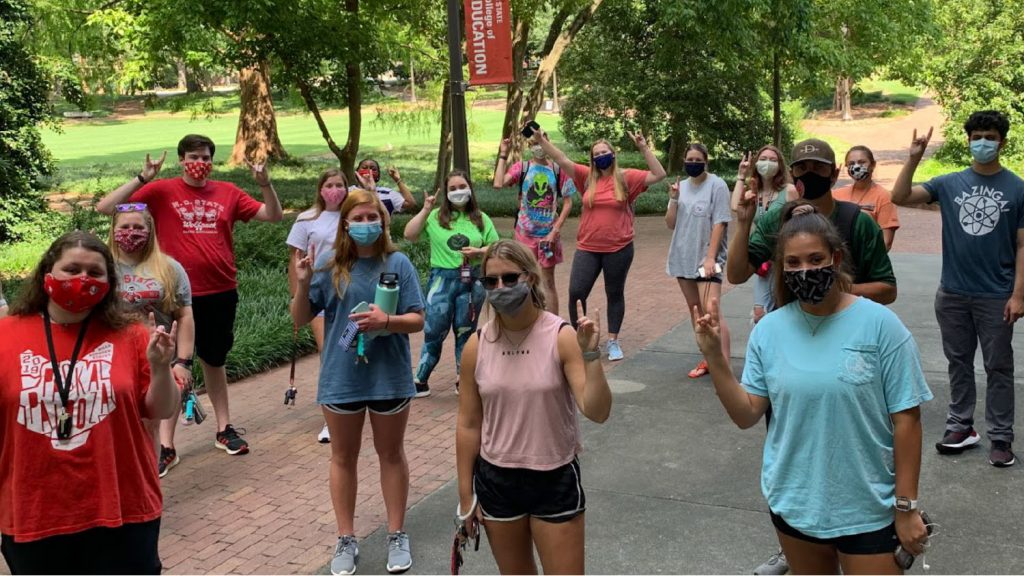
In May, NC State graduated its first group of Teaching Fellows since the North Carolina state legislators re-established the prestigious loan forgiveness program in 2018. Across the 5 host universities, NC State is now home to nearly 120 Teaching Fellows — which is about one-half of all fellows in the state — by far the most. This fall, NC State welcomed 52 first-year, transfer, Master of Arts in Teaching and licensure-only students, making up the third cohort of Teaching Fellows at NC State — the largest new cohort in North Carolina.
Nearly 1/2
of all Teaching Fellows in North Carolina are preparing at NC State
College of Education alumni earned over a dozen district and statewide honors for their work in local schools and in the field of education.
Over the past year, College of Education alumni and students were recognized for their outstanding contributions to local schools, districts and the field of education through their work in the classroom as teachers, counselors and administrators. They garnered awards such as Wake County Assistant Principal of the Year, Franklin County Principal of the Year, Nash County Teacher of the Year, and North Carolina’s School Counseling Director of the Year, Social Studies Teacher of the Year and History Teacher of the Year.
College of Education faculty and staff swiftly adapted and pivoted to provide high quality instruction and support to students.
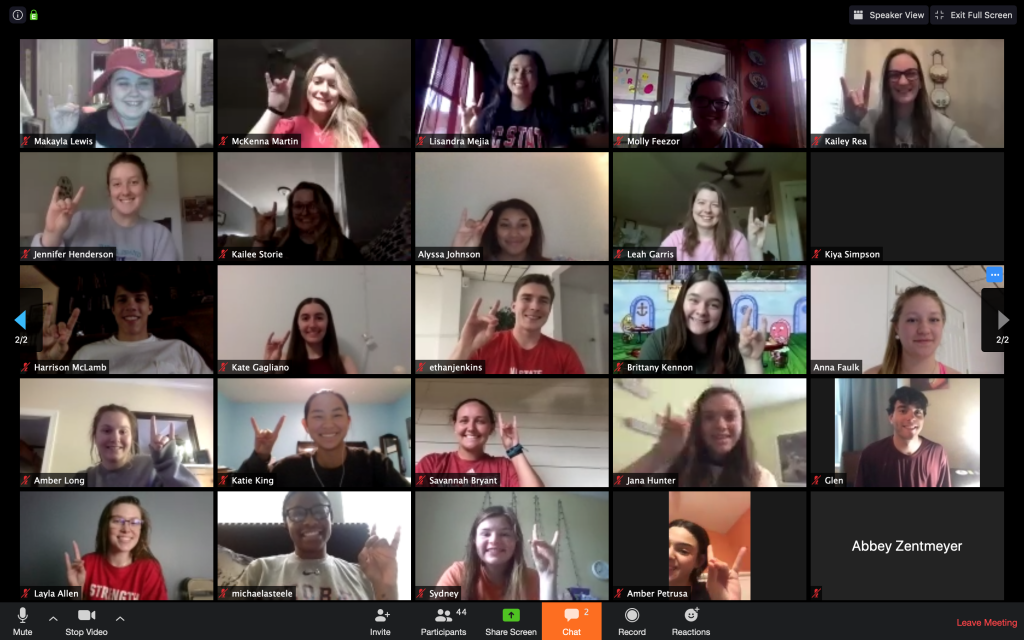
Amid COVID-19, the college adapted and introduced new ways of support for students. With support from the Excellence Fund, the college offered grants to eight doctoral students to help offset those challenges to complete their dissertation research. Faculty found ways to adapt their courses to continue to offer highly relevant and personal instruction, METRC kept students connected through a summer audiobook club, Teaching Fellows connected over virtual dinners and the Student Success and Advising Center offered support through virtual engagement.
Students and staff within the college also found ways to support each other and their local communities through various projects, including virtual one-on-one meetings and online academic advising, tutoring and coaching.
College of Education faculty reached national audiences and advanced knowledge through scholarship and publications.

College of Education faculty shared their expertise through several books aimed at both educators and researchers. Professor Carla Johnson, Ph.D., served as the lead editor for the first-ever Handbook of Research on STEM Education, to which several other College of Education faculty and staff contributed chapters. Activating Math Talk: 11 Purposeful Techniques for Your Elementary Students, authored by Professor Paola Sztajn, Ph.D., aims to help educators understand how to support and incorporate productive mathematical conversations in the classroom while Action Research for Classrooms, Schools, and Communities, authored by Associate Professor Meghan Manfra, Ph.D., helps practicing and pre-service teachers understand how to engage in action research that spans the educational ecology.
Faculty also have been cited as experts in their fields by media outlets both in North Carolina and nationally, including Time magazine, The Washington Post and the Associated Press.
“The very original idea of public education was a democracy-promoting institution. It was a recognition that democracies do not work well unless people know how to participate and engage in public decision making. To ignore that role of schools is to contribute to the downfall of democracy,” Assistant Professor Paula McAvoy told Time magazine.
College of Education students were honored for their research and service, and received prestigious fellowships and professional development opportunities.
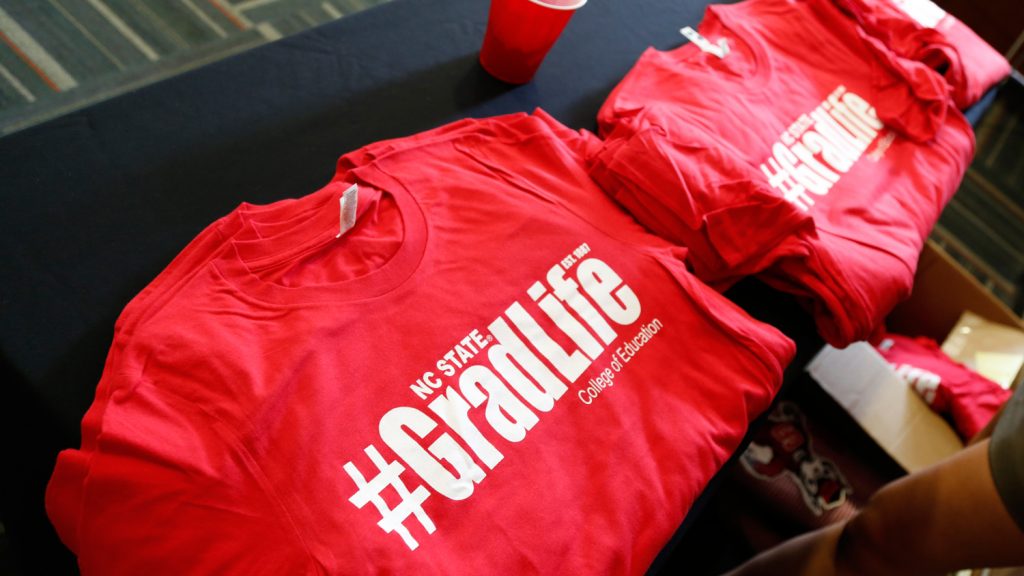
College of Education graduate students engage in impactful research and their work has been recognized on both a local and national scale. Kelly Womack Adams ‘24PHD, a doctoral student in the Department of Teacher Education and Learning Sciences, received a prestigious Graduate Research Fellowship from the National Science Foundation. A paper co-authored and presented by Daniela Barriga, a doctoral student in the department of Educational Leadership, Policy, and Human Development, was named the first place winner of the 2020 International Conference on School Choice and Reform Patrick Wolf Best Paper Award. Three doctoral students, John Howe ‘21EDD, Frederique Yova ‘21PHD and Teresa Leavens ‘21PHD were accepted into NC State’s Preparing the Professoriate (PTP) program, a nationally recognized program designed to give exceptional doctoral students an immersive mentoring, teaching and future faculty preparation experience.
“I am honored to have been selected as one of the winners of [the National Science Foundation’s Graduate Research Fellowship] and I am extremely excited to see what opportunities this presents for me,” said Kelly Womack Adam, a doctoral student in the Department of Teacher Education and Learning Sciences’ elementary education in mathematics and science program area of study.
Dean Mary Ann Danowitz announced that the College of Education Excellence Fund will focus on four priority areas that support students and address urgent educational needs.
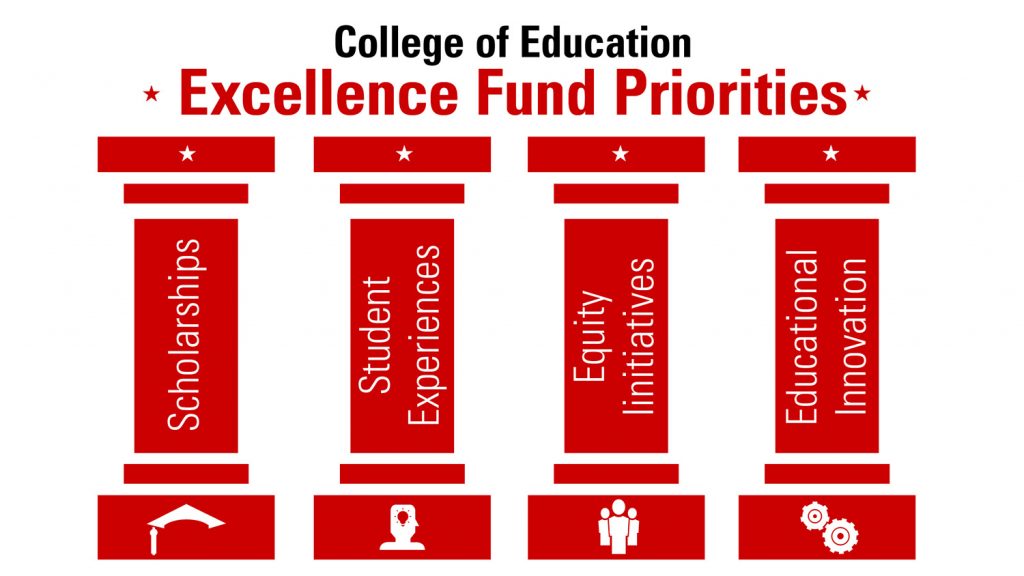
Gifts that are made to the College of Education Excellence Fund provide support to four development priority areas — student scholarships, student experiences, equity initiatives and education innovation. Dean Mary Ann Danowitz administers the fund, which gives her the discretion in directing funds toward the most critical needs and priorities.
Gifts to the College of Education Excellence Fund in the past year have helped seed a more diverse next generation of North Carolina educators through the Leadership Institute for Future Teachers program, which works to inspire high school seniors of color and bilingual students to explore careers in education; highlight and honor leadership in multiculturalism in education through the Don C. Locke Multicultural and Social Justice Symposium; and build student experiences in high-need communities through a summer internship program that gives future teachers the opportunity to work with some of the state’s most vulnerable populations.
Support to the College of Education Excellence Fund has also gone toward student-teacher mini grants, which helps offset out-of-pocket expenses associated with student teaching; research and professional development opportunities where students learn from faculty; and hands-on learning experiences and professional development through initiatives like The Literacy Space. The Excellence Fund helps to support student experiences on and off campus, helping to prepare extraordinary educators.
